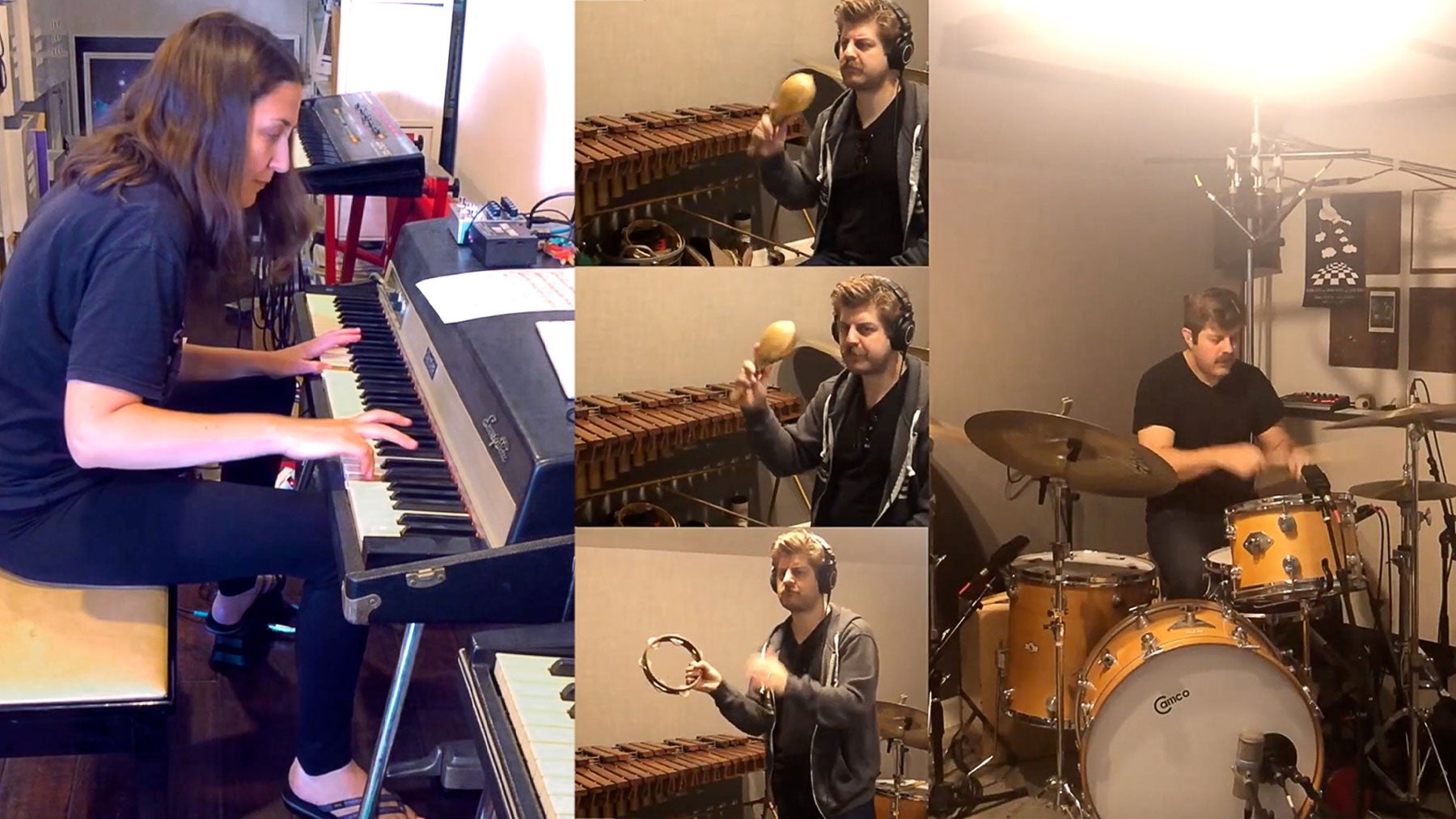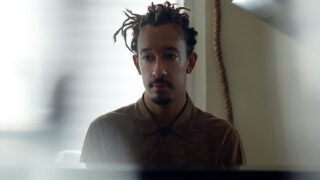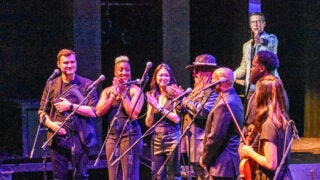USC studio guitar students take online learning into the future
The USC Thornton School of Music saw COVID-19 and stay-at-home orders as an opportunity to show students how the music industry really works — remotely.
When the COVID-19 pandemic forced classes online, Nick Stoubis knew the adjustment would come with its share of hiccups: The USC Thornton School of Music professor and chair of the Studio Guitar program could no longer be there in person to play along with his students.
But what started as a slight hindrance turned out to be the professional opportunity his students were looking for. They jumped at the chance to start recording music from their own personal performance spaces — an experience that gets them ready for the future.
“Young musicians have more opportunities to learn how to produce professional recordings than when I was a student,” he said. “We have the ability to record music at an extraordinarily high quality in our homes. If we don’t tap into that, we are leaving a major benefit of this modern day on the table.”
Dylan Gorenberg, a student who has landed a gig with a South Korean TV show, says recording remotely prepared him. (Illustration/Sean David Christensen) Click on the image to watch the video.
Stoubis looked at what his students had accomplished already — up until when remote classes began — and what needed to be completed by the end of the semester to meet course and degree objectives. Then he had to figure out how to repurpose the activities the students were already engaged in for different scenarios, including capstone projects such as recitals.
He learned early on that online learning prevented synchronous lessons and that live performing in a group setting would not be possible. Not being able to play together presented a collaborative challenge, requiring him to get creative to provide a strong learning environment. This created an important shift to refocus on professional recording.
“A great deal of the recording work I do is performed remotely, and this is how a lot of my professional work is conducted,” Stoubis said.
“A lot of music professionals have studios, as I have in my home here, where we can work and record individually,” he added. “This seems to be something that is not going to stop after the current crisis is in our rearview mirror, and I believe that effective and competent use of these new technologies will inform how we work moving forward in the music industry.”
Studio guitar students find new ways to record online
Dylan Gorenberg can attest to both the pros and cons of both teaching and learning online. As a master’s student in the Studio Guitar program, Gorenberg — much like Stoubis — said that synchronous lessons were challenging. Even simple start cues like “1, 2, 1, 2, 3, 4” were a difficult task due to the occasional video lag, and early collaborative efforts did not exactly go smoothly.

“We had to take a step back to realize what we’re trying to accomplish,” Gorenberg said. “We put in a lot of work and by the end got something that was usable, so I think everyone learned a lot about how to record.”
In a typical semester, Stoubis said the Studio Guitar program hosts performance workshops where guitar students perform with a professional rhythm section — a bass player and a drummer — hired by the university. “We decided early on that students would do recording projects to complete recital requirements, due to the reality that they would be unable to perform live because of the COVID-19 crisis and the need for social distancing,” he said.
He decided to bring in a familiar rhythm section as well as a keyboardist. He hired trioKAIT, a jazz trio led by two USC Thornton alums, pianist Kait Dunton and drummer Jake Reed, as well as bassist Cooper Appelt. The trio played on seven different USC guitar recital recording projects during the semester.
“We needed someone that would be able to play at a world-class level, to capture that in a recording and have the ability to work with students and understand that this was uncharted territory for some of them,” Stoubis said.
Dutton and Reed are married and met while doctoral students at USC. The latter and Appelt had worked as a rhythm section with USC students previously, but this was the first time all three had collaborated in this capacity. Despite the remote learning aspect, Reed and Dutton said the process was not overly difficult, as many professional musicians already know how to work and record at home.
Dutton and Reed would record their piano and drum parts before sending them to Appelt to record his bass parts. Students would then receive the full rhythm sections to play along with and record their parts.
“It kind of became this cool, real-world opportunity for these guitar students to see basically how we do a lot of recording, even pre-pandemic,” Reed said.
Remote recording still allows for cohesiveness, collaboration
For Dutton, the online recording experience not only helped the students understand how the industry currently works but also gave them a taste of how it’s going to be for the foreseeable future, pandemic aside.
“The remote recording thing isn’t new, and it’s certainly not going away,” Dutton said. “So being able to work with other musicians and producers in this way is really an important skill to understand.”
The couple was also amazed at the variety of work by the students, which included more traditional jazz sounds along with rock, Latin and hip-hop influences.
This past semester gave me personally some of the most rewarding teaching experiences I’ve ever had.
Nick Stoubis
“We really covered a lot of ground stylistically, and I think that was another really cool thing to do with all the students,” Reed said. “There was just such an array of styles that we got to play, which is always fun to do.”
Gorenberg agreed, saying their adaptability was able to create that cohesiveness and collaboration between students and instructors and the musicians.
“The instructors were pretty much saying, ‘We’re in this with you. We’re trying to figure it out as we go, so please give us feedback,’” he said.
During COVID-19 pandemic, music brings both performers and listeners together
For Stoubis, this semester has proven to be one of the more memorable in his career.
“This past semester gave me personally some of the most rewarding teaching experiences I’ve ever had,” he said. “It taught me more about teaching, and about the work we do at USC, perhaps more than any other semester in my teaching history.”
Though the goal was to provide students with the best professional experience possible, complete with industry-ready work for their portfolios, there seemed to be a side goal as well. During times of struggle, fear, unrest and uncertainty, it is common for people to turn to the arts for sanctuary. Musician or not, it is not farfetched to say that music serves as a unifier.
“I think what we all realized right away — when we couldn’t get together physically with our friends and family — is that we were turning towards art for solace,” Dutton said. “We still wanted to feel connected. When it’s just part of our daily lives, we forget the value of what’s there.”
From the students to the professors and professional musicians, this semester has shown that what they’re creating extends beyond the classroom or a letter grade.
“In times like these, artists play a pivotal role because they speak to what it means to be human, human emotion, human feeling, human interaction, human communication,” Stoubis said. “And music describes that in a way that’s accessible to masses of people.”



